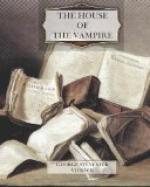“I, too, have been in a whimsical mood to-night. Fancy, unlike genius, is an infectious disease.”
“What is the peculiar form it assumed in your case?”
“I have been wondering whether all the things that environ us day by day are, in a measure, fashioning our thought-life. I sometimes think that even my little mandarin and this monkey-idol which, by the way, I brought from India, are exerting a mysterious but none the less real influence upon my work.”
“Great God!” Ernest replied, “I have had the identical thought!”
“How very strange!” Clarke exclaimed, with seeming surprise.
“It is said tritely but truly, that great minds travel the same roads,” Ernest observed, inwardly pleased.
“No,” the older man subtly remarked, “but they reach the same conclusion by a different route.”
“And you attach serious importance to our fancy?”
“Why not?”
Clarke was gazing abstractedly at the bust of Balzac.
“A man’s genius is commensurate with his ability of absorbing from life the elements essential to his artistic completion. Balzac possessed this power in a remarkable degree. But, strange to say, it was evil that attracted him most. He absorbed it as a sponge absorbs water; perhaps because there was so little of it in his own make-up. He must have purified the atmosphere around him for miles, by bringing all the evil that was floating in the air or slumbering in men’s souls to the point of his pen.
“And he”—his eyes were resting on Shakespeare’s features as a man might look upon the face of a brother—“he, too, was such a nature. In fact, he was the most perfect type of the artist. Nothing escaped his mind. From life and from books he drew his material, each time reshaping it with a master-hand. Creation is a divine prerogative. Re-creation, infinitely more wonderful than mere calling into existence, is the prerogative of the poet. Shakespeare took his colours from many palettes. That is why he is so great, and why his work is incredibly greater than he. It alone explains his unique achievement. Who was he? What education did he have, what opportunities? None. And yet we find in his work the wisdom of Bacon, Sir Walter Raleigh’s fancies and discoveries, Marlowe’s verbal thunders and the mysterious loveliness of Mr. W.H.”
Ernest listened, entranced by the sound of Clarke’s mellifluous voice. He was, indeed, a master of the spoken word, and possessed a miraculous power of giving to the wildest fancies an air of vraisemblance.
V
“Yes,” said Walkham, the sculptor, “it’s a most curious thing.”
“What is?” asked Ernest, who had been dreaming over the Sphinx that was looking at him from its corner with the sarcastic smile of five thousand years.
“How our dreams of yesterday stare at us like strangers to-day.”




